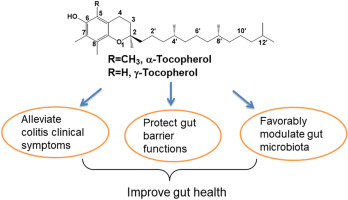💡 Gut dysbiosis, characterized by imbalances in the gut microbiota composition, is associated with various chronic diseases, including obesity, inflammatory bowel disease (IBD), and cancer. Tocotrienol, a subfamily of vitamin E, has emerged as a potential therapeutic agent due to its ability to modulate gut microbiota composition.
This scoping review synthesizes existing literature on the effects of tocotrienol on gut microbiota and its implications for disease management. Six original research studies were identified through a systematic search of PubMed, Scopus, and Web of Science databases. These studies, conducted in animal models, demonstrated that tocotrienol supplementation altered gut microbiota composition and exhibited anti-inflammatory effects, particularly in disease models associated with gut dysbiosis.
📍Key Findings:
📌 Gut Dysbiosis and Disease Pathogenesis: Gut dysbiosis is implicated in the pathogenesis of various diseases, including obesity, IBD, and cancer. Dysbiosis leads to systemic inflammation through the activation of the immune system by endotoxins produced by gut microbiota.
📌 Tocotrienol Modulation of Gut Microbiota: Animal studies revealed that tocotrienol supplementation partially restored gut microbiota composition in disease models, such as colitis-associated colon cancer, obesity, and non-alcoholic fatty liver disease. Tocotrienol supplementation led to alterations in the abundance of specific bacterial species, including 𝘍𝘪𝘳𝘮𝘪𝘤𝘶𝘵𝘦𝘴, 𝘉𝘢𝘤𝘵𝘦𝘳𝘰𝘪𝘥𝘦𝘵𝘦𝘴, 𝘗𝘳𝘰𝘵𝘦𝘰𝘣𝘢𝘤𝘵𝘦𝘳𝘪𝘢, 𝘢𝘯𝘥 𝘈𝘤𝘵𝘪𝘯𝘰𝘣𝘢𝘤𝘵𝘦𝘳𝘪𝘢.
📌 Anti-inflammatory Effects: Tocotrienol demonstrated strong anti-inflammatory effects in animal models, suppressing pro-inflammatory cytokines such as IL-6, IL-1β, and TNF-α. The suppression of inflammation may result from the correction of gut dysbiosis or the direct immuno-modulatory effects of tocotrienol.
📌 Two-Way Relationship: The relationship between gut microbiota and tocotrienol is bidirectional. While tocotrienol alters gut microbiota composition, gut microbiota also metabolizes tocotrienol. The presence of gut microbiota decreases the bioavailability of tocotrienol, posing challenges for its therapeutic efficacy.
📌 Mechanistic Insights: The mechanisms by which tocotrienol modulates gut microbiota remain elusive. Tocotrienol may affect bacterial HMGR expression and efflux pumps, but further validation is needed. Direct evidence linking tocotrienol-induced changes in gut microbiota to anti-inflammatory effects is lacking.
📌 Clinical Implications: Limited evidence from clinical trials underscores the need for further research to validate the therapeutic potential of tocotrienol in managing gut dysbiosis-associated diseases. Clinical trials investigating the effects of tocotrienol on gut microbiota in obesity and sarcopenia are underway, providing insights into its translational potential.
📍 Tocotrienol emerges as a promising candidate for managing diseases associated with gut dysbiosis, owing to its ability to modulate gut microbiota composition and exert anti-inflammatory effects. Preclinical studies demonstrate the therapeutic potential of tocotrienol in restoring gut microbiota diversity and suppressing inflammation in various disease models. However, mechanistic insights into tocotrienol’s modulation of gut microbiota and its clinical implications remain to be fully elucidated. Further research, including clinical trials, is warranted to validate the therapeutic efficacy of tocotrienol and its role in managing gut dysbiosis-associated diseases.
Link to the Article : https://tinyurl.com/2ru7ffas
